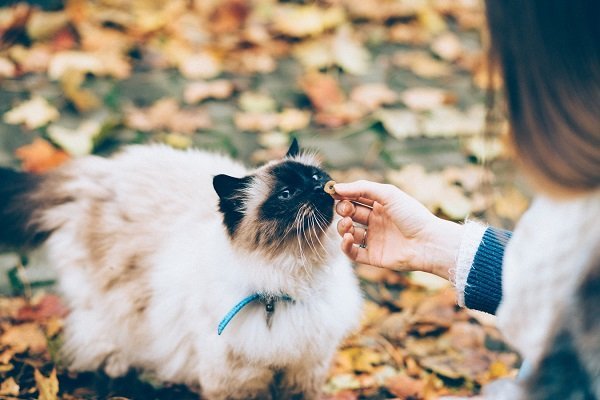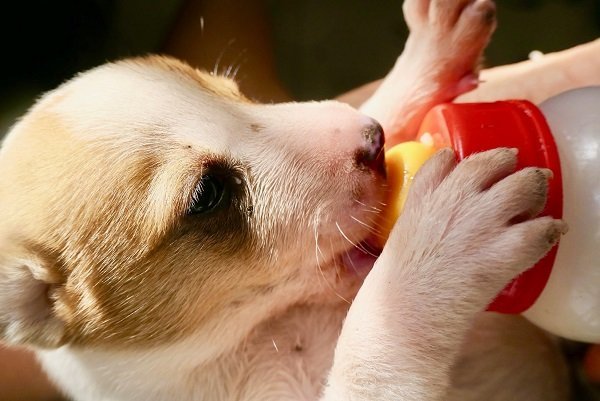If you have been shopping for treats at a pet store, you will notice many products that have a cheese flavor in them. With all the food that is not allowed for your dogs or cats to eat, is cheese one of those foods? Let’s find out as we provide details on the ingredients found in the dairy product. But first, we must talk about the main ingredient used to make cheese, which is milk, and see the different chemicals and elements that make it up.
Milk and Lactose
Milk has a certain component within it called lactose that may be hard for dogs or cats to digest. Most dogs can tolerate lactose, but a majority of cats are lactose intolerant. If your dog or cat suffers from lactose intolerance, he or she may experience abdominal pain, diarrhea, and vomiting.
However, one would notice that some of these pets, especially younger ones, love drinking milk whenever they are given it. So, what remedy did pet food companies do in order to satisfy the “demands” of pets when it comes to milk? The answer is milk with less or even no lactose at all.
While humans also have lactose-free milk, a few companies have formulated milk specially made for pets to drink. However, older or mature pets don’t usually have an appetite for milk anymore; instead, they would rather get cheese-flavored treats.
Cheese for Dogs
Dogs and cats have drastically different digestive systems, so making a generalization on their tolerance for cheese may not be correct. First, let us discuss if dogs can eat cheese, then we will get to talk about cats and their capability to consume the dairy product.
As stated before, dogs typically have a high tolerance for lactose. But what they are not that tolerable of is fat, and cheese contains a lot of this nutrient. Because cheese is high in fat, dogs may suffer from obesity if they are constantly fed with cheese-flavored food products. If dogs are overweight, there is a high chance that they may also get pancreatitis, which is a serious fatal disease for them.
Furthermore, some cheeses may have herbs in them like onions and garlic, and these ingredients are toxic to dogs. Onions contain numerous amounts of the compounds called thiosulfates and disulfides, which are harmful to both dogs and cats, and they would often cause damage to red blood cells in the pet’s body. Garlic is much worse, as it contains five times more of the said compounds than a single onion.
If you truly want your dog to eat cheese, it is better to give them the ones that are low in fat and doesn’t contain herbs. These low-fat cheeses include goat cheese, yak cheese, and mozzarella. Also, there is actually a benefit for feeding cheese to dogs. Cheeses are rich in calcium and protein, which are essential nutrients that dogs need to have strong bones and healthy muscles.
Cheese for Cats
Same as dogs, cats don’t naturally eat cheese and milk, but because these dairy products are high in fat, they usually are quite appetizing for our feline companions. But, as mentioned before, cheese and milk have high amounts of lactose, which makes it difficult for cats to digest them.
Humans, as well as other animals who are omnivores, produce an enzyme called lactase that helps in breaking down lactose in their digestive system. However, cats and dogs don’t possess these enzymes in their bodies, thus preventing them from digesting cow’s milk and cheese properly. Moreover, because cats are generally smaller than dogs, they have a lower tolerance towards cheese since they also have a smaller digestive system.
Interestingly, kittens would have a high amount of the lactase enzyme in their body, but as they get older, their body’s production of the enzyme gets fewer and fewer until it no longer produces it.
Besides lactose and fat, cheese also contains salt, and salt can sometimes cause sodium poisoning if they are consumed in high quantities. Most pet treats and foods contain salt, but cheese, in particular, has high amounts of it.
It is still safe for cats to eat cheese, as long as they are eating it in small quantities. Cheese makes their food more appetizing, so you would see a lot of pet treats that contain cheese in them. But before purchasing these treats, make sure that they are low in salt, fat, and lactose.
And, there you have it, the answer to the question of whether cheese and dairy products are safe and good to eat for your pets. Like most tasty foods, pets should only eat them in moderation, similar to how we should only eat fries, burgers, and other fatty foods every once in a while. We have control over our pets’ health, and we should always monitor what they eat so that they would remain energetic and healthy.


